This blog post will be on a very weird mash-up of a few of my interests, Rome: Total War, Avatar: The Last Airbender, and of course the R programming language! I’ll introduce these drastically different interests first…
“and now for something completely different…”
- What is Rome: Total War?
- What is Avatar: The Last Airbender?
- What is the Avatar: The Last Airbender mod for Rome: Total War?
- Web-scraping Avatar characters to add into the game
- Generating a “turns-per-year” script through R’s text generation capabilities
- Summary
What is Rome: Total War?
- A turn-based strategy RPG game set in the early years of the Roman Republic that was released back in 2004. There’s both a campaign map where you do management (akin to say, Civ or EU games) but a major difference to those games is that you can also fight the battles yourself on the battle map with the troops you’ve recruited.
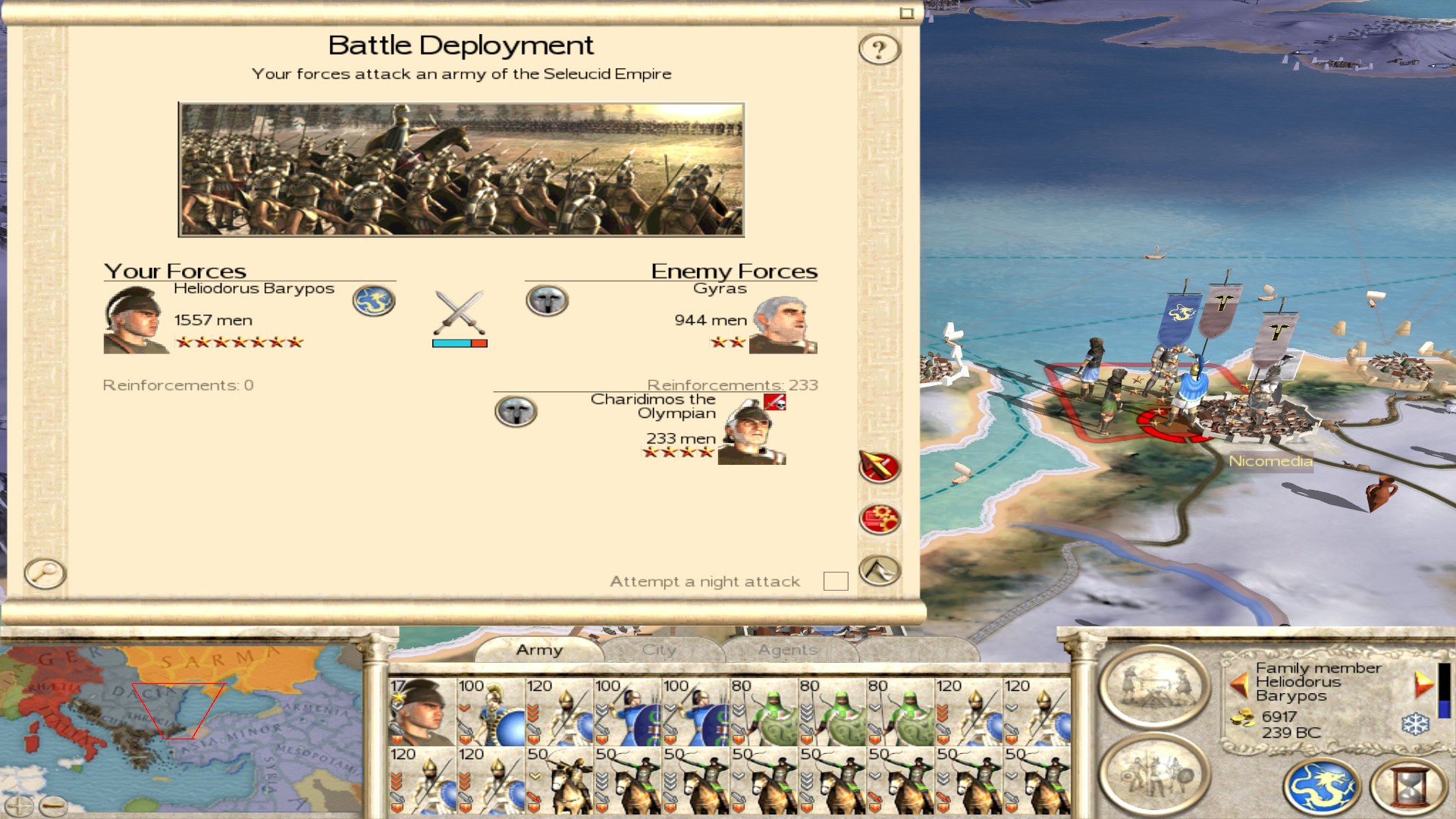
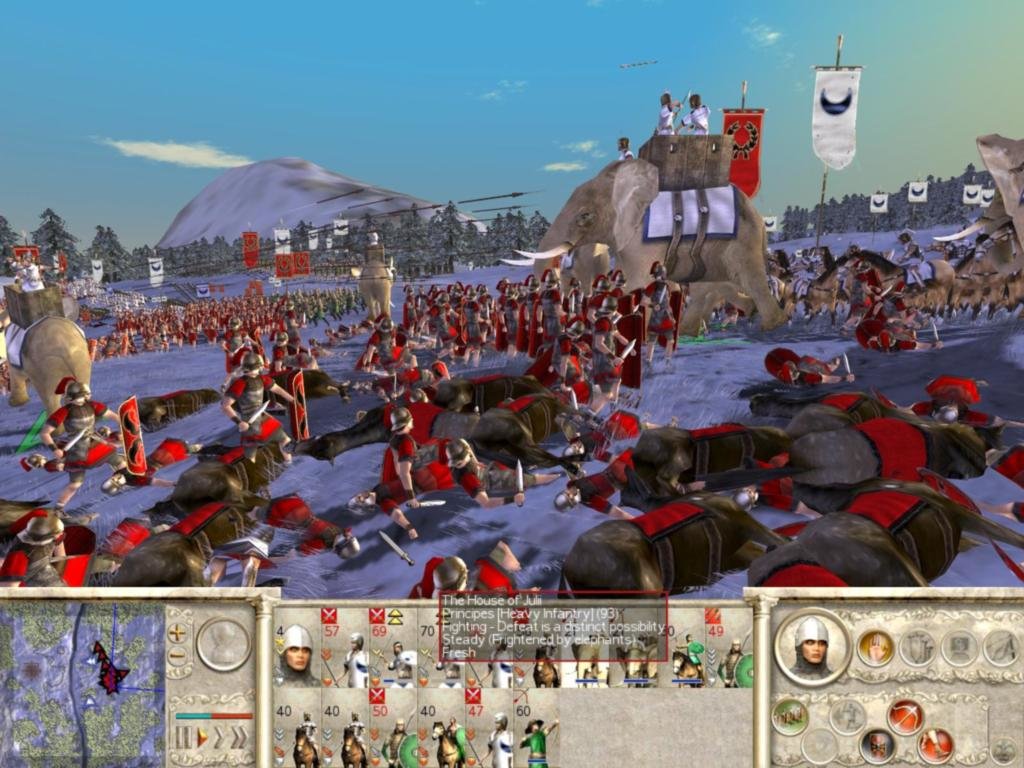
- It’s probably the game I’ve played the most, ever. Yes, even more than FIFA actually (I haven’t played FIFA in nearly a decade now…). I have the original CD version that I bought when I lived in Israel, the Steam version which I play on today, and I also got the Re-mastered version as that’s the version that works with the Avatar mod. Despite newer games in the series and lots of other games in general, I just keep coming back to it over the past 20 years!
What is Avatar: The Last Airbender?
-
An animated TV series from the mid-2000s about a group of teenagers from various “tribes/nations” (based on Fire, Air, Water, and Earth elements) who set out to restore balance and harmony to their world which has been ravaged by war for the past 100 years.
-
It’s actually better if you just watch the 45-second opening as it sets the scene extremely well in a succinct manner, click the image below:
-
It got pretty popular (again) during the pandemic I feel… Most likely because the people who watched it when they were kids are right around the late 20s/early 30s-ish age that are pretty active on social media and people wanted some comfort-shows to watch in the early-pandemic-uncertain-times.
-
I’m the creator of the {tvthemes} R package that gives you a collection of {ggplot2} themes and color palettes from TV shows, including Avatar: The Last Airbender!

What is the Avatar: The Last Airbender mod for Rome: Total War?
-
Basically combining the first two interests above into ONE!
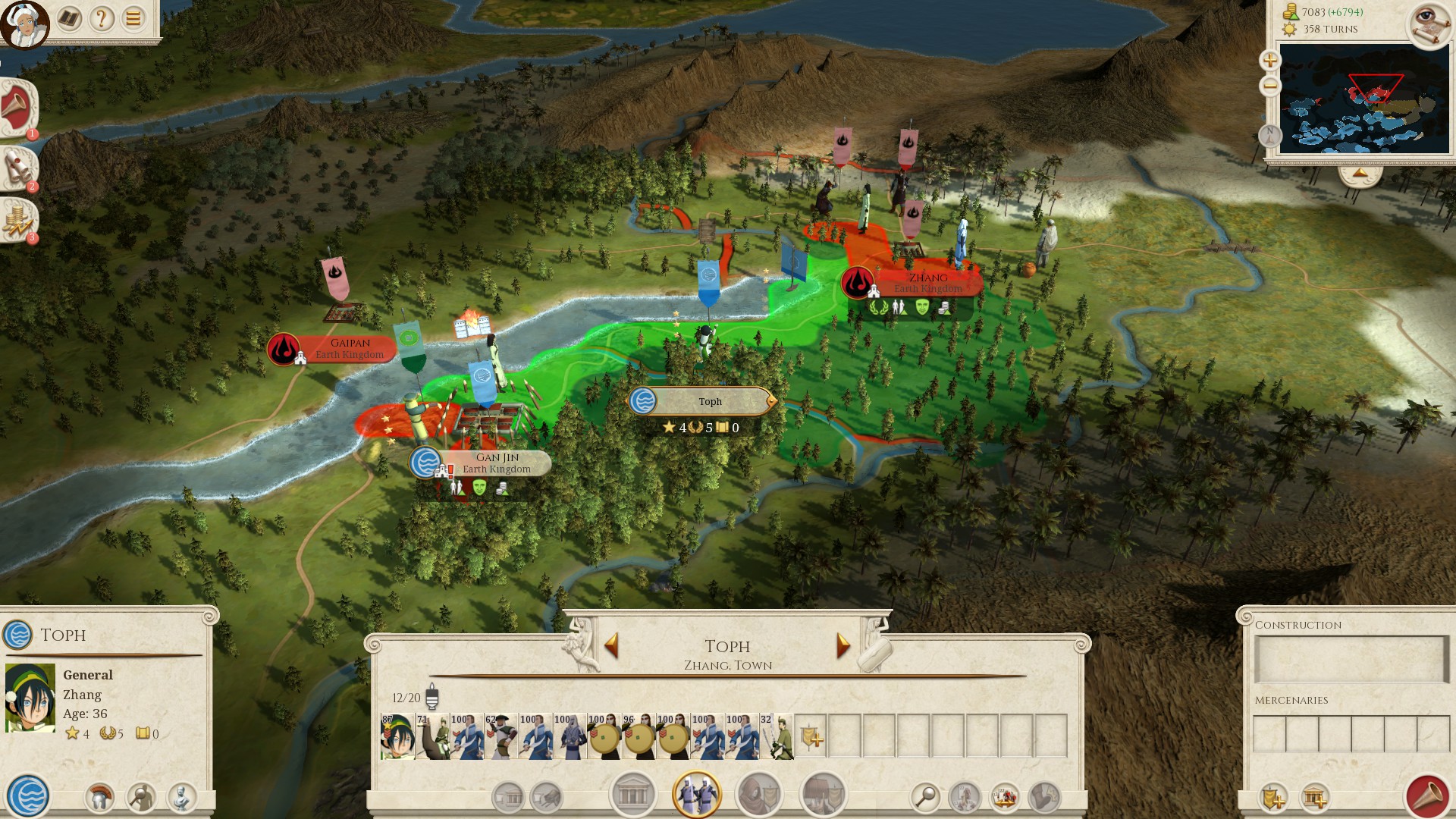
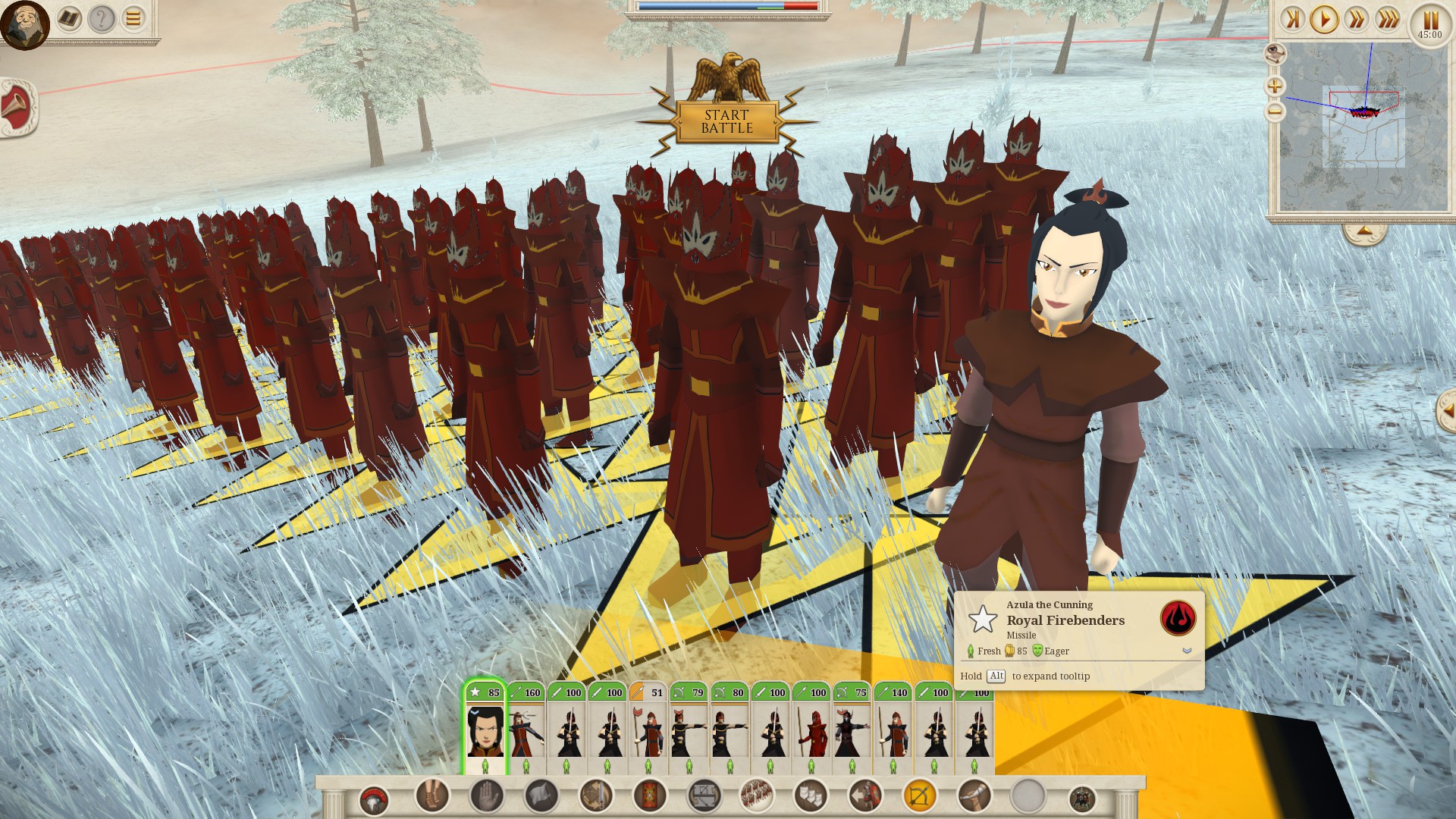
- Note: I’m not the creator of the mod, just helping out.
I was working on this during summer/fall of last year but then I got busy (J.League review, World Cup, etc.) so I never wrote up the blog post in full. A lot of the actual modding is obviously done outside of R, but as always I was able to find ways to use R to my advantage to improve this mod.
Let’s get started!
Web-scraping Avatar characters to add into the game
When I first came across this mod, I realized pretty quickly that there weren’t a whole lot of character names for each of the tribes. So after like 50 turns or so of playing the game, you wind up having a dozen or so “Katara”s running around in your Water Tribe kingdom or 50 “Zuko”s in your Fire Nation Empire. Therefore I took it upon myself to add more character names by extracting names and gender from the Avatar fandom wiki.
First, let’s load some R packages:
library(rvest) ## web-scraping
library(polite) ## web-scraping, politely
library(dplyr) ## clean data
library(purrr) ## clean data and iteration
library(stringr) ## string/text cleaning
Before I jumped into creating a big workflow, I wanted to test how to grab the data I need based on one page, so let’s take a look at Azula’s page.
## Check out robots.txt and see if URL link is scrape-able
session2 <- bow("https://avatar.fandom.com/wiki/Azula")
## Find the character info box on the right corner and
## grab all the text, then extract the gender identifying words
gender_is <- scrape(session2) %>%
html_nodes(".portable-infobox") %>%
html_text() %>%
## Some characters are non-binary or gender isn't listed
stringr::str_extract("Female|Male|Man|Woman")
gender_is
## [1] "Woman"
Great! After flipping through a few character pages at random, this is how these pages are set up so I should be able to apply the above code to every character page to extract the character name and their gender.
NOTE: Since the time I actually worked on this last October, there’s been quite a few weird changes in the pages where instead of simply listing gender as “Male” or “Female” or otherwise, some pages keep the “Male”/“Female” set while others have “Man” or “Woman” instead… so the consistency across character pages got worse, wonderful!
So to expand this search across all characters, I tried to find a page that listed them all. There wasn’t one but there are a couple of pages that lists all characters split by tribe/nation which is still good enough for what I wanted to do.
earth_url <- "https://avatar.fandom.com/wiki/Category:Earth_Kingdom_characters"
fire_url <- "https://avatar.fandom.com/wiki/Category:Fire_Nation_characters"
water_url <- "https://avatar.fandom.com/wiki/Category:Water_Tribe_characters"
air_url <- "https://avatar.fandom.com/wiki/Category:Air_Nomad_characters"
So from here, I need to grab:
- The character’s name
- The URL link to that character’s page
## one nation
bender_url <- earth_url
bender_label <- str_extract(bender_url, "Fire|Earth|Water|Air")
cat(paste0("\nStarting: ", bender_label, "!\n"))
## Get name and page link
session <- bow(bender_url)
char_link <- scrape(session) %>%
html_nodes(".category-page__member-link") %>%
html_attr("href")
char_name <- scrape(session) %>%
html_nodes(".category-page__member-link") %>%
html_text()
base_url <- "https://avatar.fandom.com/"
earth_df <- data.frame(
char_link,
char_name
) %>%
## Strip out 'Category:' pages that aren't single character page links
filter(!str_detect(char_link, "Category")) %>%
mutate(char_link = paste0(base_url, char_link))
cat("\nNames and page link done!\n")
tail(earth_df, 10)
## char_link char_name
## 190 https://avatar.fandom.com//wiki/Rhee Rhee
## 191 https://avatar.fandom.com//wiki/Rin Rin
## 192 https://avatar.fandom.com//wiki/Rose Rose
## 193 https://avatar.fandom.com//wiki/Royal_messenger Royal messenger
## 194 https://avatar.fandom.com//wiki/Ru Ru
## 195 https://avatar.fandom.com//wiki/Ryu Ryu
## 196 https://avatar.fandom.com//wiki/Ryu%27s_mother Ryu's mother
## 197 https://avatar.fandom.com//wiki/Saiful Saiful
## 198 https://avatar.fandom.com//wiki/San San
## 199 https://avatar.fandom.com//wiki/San_Ho San Ho
Then use that information to:
- Jump into each character page to find their gender
- Bind all individual character info into one data.frame and save that as a file
## find all genders at once
earth_namegender_df <- map(
earth_df$earth_link,
~ get_gender(data = earth_df, link = .x)
) %>%
purrr::reduce(earth_namegender_df, bind_rows)
saveRDS(earth_namegender_df, file = "data/earth_namegender_df.RDS")
tail(earth_namegender_df, 10)
## char_link char_name gender
## 190 https://avatar.fandom.com//wiki/Rhee Rhee Male
## 191 https://avatar.fandom.com//wiki/Rin Rin Female
## 192 https://avatar.fandom.com//wiki/Rose Rose Female
## 193 https://avatar.fandom.com//wiki/Royal_messenger Royal messenger Male
## 194 https://avatar.fandom.com//wiki/Ru Ru Female
## 195 https://avatar.fandom.com//wiki/Ryu Ryu Male
## 196 https://avatar.fandom.com//wiki/Ryu%27s_mother Ryu's mother Female
## 197 https://avatar.fandom.com//wiki/Saiful Saiful Male
## 198 https://avatar.fandom.com//wiki/San San Male
## 199 https://avatar.fandom.com//wiki/San_Ho San Ho Male
Of course, after running through one nation’s worth of character pages I can then standardize it as one big function to take any of the character list URLs.
get_character_info <- function(bender_url) {
bender_label <- str_extract(bender_url, "Fire|Earth|Water|Air")
cat(paste0("\nStarting: ", bender_label, "!\n"))
## Get name and page link
session <- bow(bender_url)
char_link <- scrape(session) %>%
html_nodes(".category-page__member-link") %>%
html_attr("href")
char_name <- scrape(session) %>%
html_nodes(".category-page__member-link") %>%
html_text()
base_url <- "https://avatar.fandom.com/"
char_df <- data.frame(
char_link,
char_name
) %>%
## Strip out 'Category:' pages that aren't single character page links
filter(!str_detect(char_link, "Category")) %>%
mutate(char_link = paste0(base_url, char_link))
cat("\nNames and page link done!\n")
## Get gender
get_gender <- function(data, link) {
cat(paste0("\nStarting: ", link))
session2 <- bow(link)
gender_is <- scrape(session2) %>%
html_nodes(".portable-infobox") %>%
html_text() %>%
stringr::str_extract("Female|Male|Man|Woman") ## Some are "Non-binary" or gender isn't listed
cat(paste0("\nGender: ", gender_is))
final_df <- data %>%
filter(char_link == link)
if (class(gender_is) != "character") {
final_df <- final_df %>%
mutate(gender = NA_character_)
} else {
final_df <- final_df %>%
mutate(gender = gender_is)
}
cat("\nDone!\n")
return(final_df)
}
char_namegender_df <- map(
char_df$char_link,
~ get_gender(data = char_df, link = .x)
) %>%
purrr::reduce(bind_rows)
saveRDS(char_namegender_df, file = here::here(paste0("data/", bender_label, "_namegender_df.RDS")))
cat(paste0("\nScript for: ", bender_label, " done!\n"))
}
You can see the complete script on GitHub here.
From here I basically shoved all these character names by nation/tribe
into the game’s character files using NotePad++ since most of the game
is built on simple text files so it’s very easy to mod! The model/map
rendering and stuff is obviously much harder though.
Aaand voila!
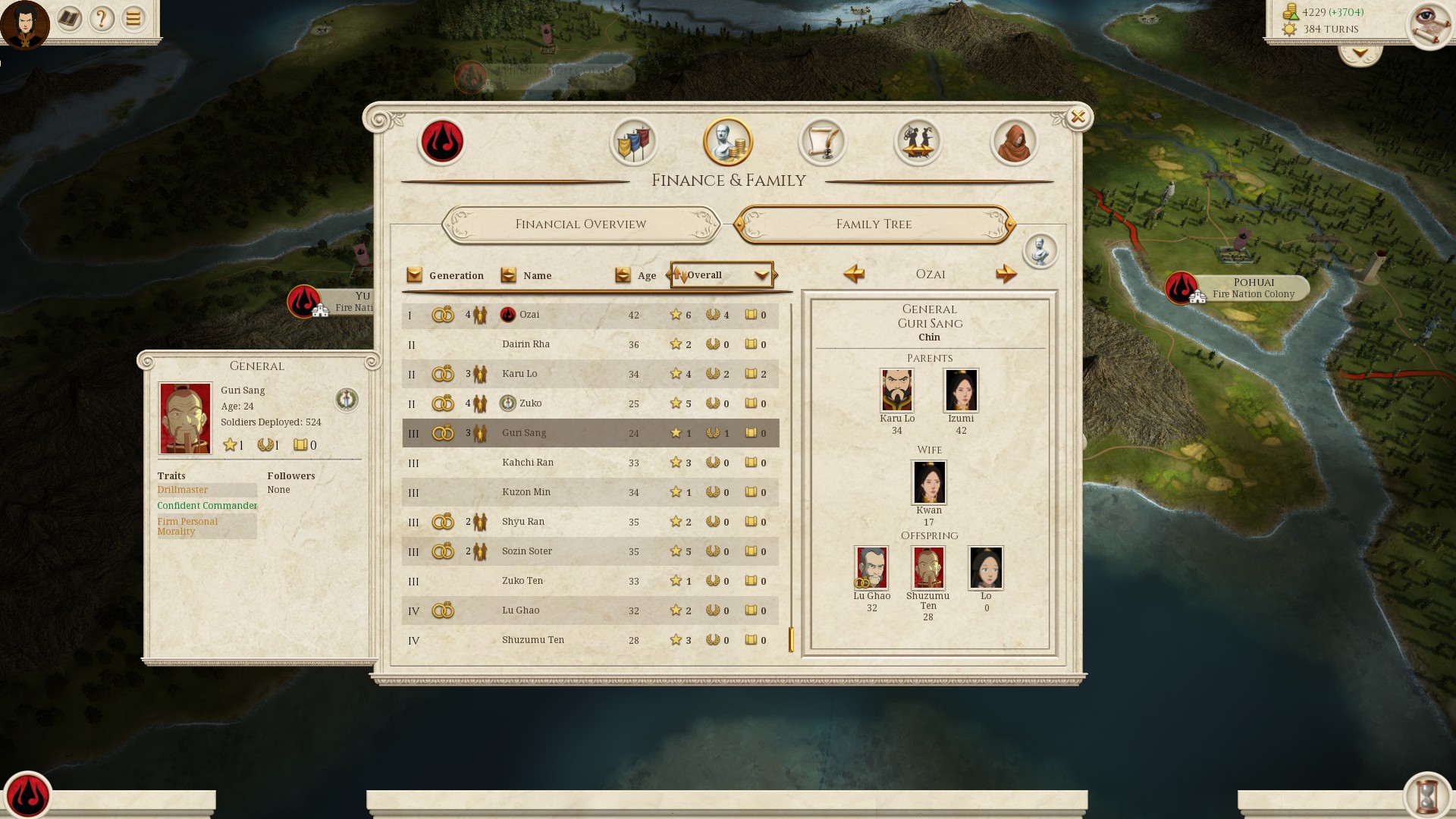
Generating a “turns-per-year” script through R’s text generation capabilities
The way the campaign is set up in this game is that the seasons alternate every two turns (summer, winter) and two turns make up a full year. However, this can create problems where your favorite characters age really quickly and you don’t get to spend a whole lot of time developing their skills and role-playing as them before they kick the bucket. So throughout all the different total war games, there have been mods or scripts made to extend the “turns-per-year” mechanic in the campaign (4, 8, 16, turns-per-year, etc. depending on the setting/size of map/etc.).
This is especially true for a mod like Avatar: The Last Airbender. While, all the protagonists start off as young teenagers, the fact that they can die in only 100 or so turns makes the campaign a bit drab once they all bite the dust and are replaced by a bunch of randomly generated characters. Not very fun or immersive for role-playing. So I decided to take a shot at re-creating the “turns-per-year” script seen in the base game for the “Re-mastered” version of Rome Total War.
First, I set up the base data.frame. cons_date is the year repeated 4
times each to represent 4-turns-per-year. Most people won’t play up to
200 turns but just in case I extended it to 800 turns in the turn_num
variable. Keep in mind that we’re starting from turn 0/zero and not
turn 1.
I create a separate vector that makes sure to change the season every 4 turns starting from turn 2. Then I set a separate vector representing which turns will be the “winter” turns, starting from turn 3 (since we’re first changing the season after turn 2).
## Generate turn numbers and other vars
turn_df <- data.frame(
cons_date = rep(1:200, each = 4),
turn_num = seq(0, 799)
)
glimpse(turn_df)
## Rows: 800
## Columns: 2
## $ cons_date <int> 1, 1, 1, 1, 2, 2, 2, 2, 3, 3, 3, 3, 4, 4, 4, 4, 5, 5, 5, 5, ~
## $ turn_num <int> 0, 1, 2, 3, 4, 5, 6, 7, 8, 9, 10, 11, 12, 13, 14, 15, 16, 17~
season_change_turn <- seq(2, 800, by = 4)
winter_turn <- seq(3, 800, by = 4)
From here I open up a file to write my code into: 4tpy_AV.txt. From
there I use cat() calls to push text into the file that I created,
first some comments describing what this script is doing.
fileName <- sprintf("4tpy_AV.txt")
message(sprintf("Writing %s...", fileName))
r <- file(fileName, open = "w")
cat(file = r, "; GENERATED by RN-7 via R script\n\n")
cat(file = r, "script\n\n")
cat(file = r,
"; 4 turns per year script\n")
cat(file = r,
"; starting year: 1, ending year: 200\n\n")
cat(file = r,
"while I_TurnNumber < 800\n\n")
cat(file = r,
"
suspend_during_battle on\n")
From here, it’s a giant for loop of setting the text snippet for each
turn/season.
## for loop
for (i in 1:nrow(turn_df)) { # 1:nrow(turn_df)
# print(turn_df[i, 1]) # cons_date
# print(turn_df[i, 2]) # turn_num
## check if 'i' is season changing turn
if (turn_df[i, 2] %in% season_change_turn) {
cat(file = r,
sprintf("
console_command date %s
console_command season summer
monitor_event FactionTurnEnd FactionType slave
if I_TurnNumber = %s
console_command season summer
end_if
terminate_monitor
end_monitor
while I_TurnNumber = %s
end_while\n\n",
turn_df[i, 1], turn_df[i, 2], turn_df[i, 2]
)
)
} else if (turn_df[i, 2] %in% winter_turn) {
cat(file = r,
sprintf("
console_command date %s
console_command season winter
while I_TurnNumber = %s
end_while\n\n",
turn_df[i, 1], turn_df[i, 2]
)
)
} else {
cat(file = r,
sprintf("
console_command date %s
console_command season summer
while I_TurnNumber = %s
end_while\n\n",
turn_df[i, 1], turn_df[i, 2]
)
)
}
}
## Close connection to file ----
close(r)
So I run the entire script in one go and boom!
## Generate turn numbers and other vars
turn_df <- data.frame(
cons_date = rep(1:200, each = 4),
turn_num = seq(0, 799)
)
# cons_date <- rep(1:200, each = 4)
# turn_num <- seq(0, 800)
season_change_turn <- seq(2, 800, by = 4)
winter_turn <- seq(3, 800, by = 4)
fileName <- sprintf("4tpy_AV.txt")
message(sprintf("Writing %s...", fileName))
r <- file(fileName, open = "w")
cat(file = r, "; GENERATED by RN-7 via R script\n\n")
cat(file = r, "script\n\n")
cat(file = r,
"; 4 turns per year script\n")
cat(file = r,
"; starting year: 1, ending year: 200\n\n")
cat(file = r,
"while I_TurnNumber < 800\n\n")
cat(file = r,
"
suspend_during_battle on\n")
## for loop
for (i in 1:nrow(turn_df)) { # 1:nrow(turn_df)
# print(turn_df[i, 1]) # cons_date
# print(turn_df[i, 2]) # turn_num
## check if 'i' is season changing turn
if (turn_df[i, 2] %in% season_change_turn) {
cat(file = r,
sprintf("
console_command date %s
console_command season summer
monitor_event FactionTurnEnd FactionType slave
if I_TurnNumber = %s
console_command season summer
end_if
terminate_monitor
end_monitor
while I_TurnNumber = %s
end_while\n\n",
turn_df[i, 1], turn_df[i, 2], turn_df[i, 2]
)
)
} else if (turn_df[i, 2] %in% winter_turn) {
cat(file = r,
sprintf("
console_command date %s
console_command season winter
while I_TurnNumber = %s
end_while\n\n",
turn_df[i, 1], turn_df[i, 2]
)
)
} else {
cat(file = r,
sprintf("
console_command date %s
console_command season summer
while I_TurnNumber = %s
end_while\n\n",
turn_df[i, 1], turn_df[i, 2]
)
)
}
}
## Close ----
close(r)
You can find the actual script file here.
Unfortunately, I don’t know enough about modding to make the UI track the “actual” date rather than just the year. So in the campaign map you just get:
- “Year 1 (Summer icon)”, “Year 1 (Summer icon)”, “Year 1 (Summer icon)”, “Year 1 (Winter icon)”,
- “Year 2 (Summer icon)”, “Year 2 (Summer icon)”, “Year 2 (Summer icon)”, “Year 2 (Winter icon)”,
- “Year 3 (Summer icon)” … and so on…
This wasn’t a problem in the UI for the original (Steam and CD-ROM) versions of Rome: Total War, so I’m still thinking of ways to fix that for the re-mastered version before I push it to the mod for review…
Summary
In terms of character names, by web-scraping the wiki I was able to add around 300 more male/female/last names for all the different factions.
As noted in the previous section, the implementation for the
4-turns-per-year feature needs a bit more work but the R script itself
is fine. Anyway, this kind of text-generation scheme is how I set up my
soccer data analysis workflow that you might have seen in my past
J.League reviews. Each year or half-a-season I am creating the same
visualizations from similar data sets. The only thing that changes is
the name of the folders or the name of the data sets (ex. 2022_data to
2023_data), names of the teams involved (which I can just grab from
the incoming data set), etc… so I really only need to define these as
variables at the top of my script then carefully make sure that the text
I’m generating will create the exact set of
data-cleaning/data-visualization code that I need with the new data set.
I can run the script to generate the R script file using the new
season//half-a-season//whatever variables, then run the script itself
and all my data viz pop up! It saves me a lot of time as I don’t have to
copy-paste my previous script and then find-replace stuff like 2022 to
2023 and whatnot.
For those curious, here are a few other things I did/am working on for the mod:
- Added new settlements (no R, unfortunately… mostly me getting to grips with good ol’ MS Paint and GIMP)

- Added new character portraits. Like with the character names, the mod was just recycling the same 8 or so pics which got old pretty fast once you started growing your empire and gained more generals/family members.
Here’s the link to the GitHub repo where I keep all my stuff (not a whole lot to see to be honest, just a bunch of work-in-progress stuff):
Hope this was as fun to read as I had doing it!